Trip report and photos continued from page 1:
Scarlet bougainvillea spills over the whitewashed walls of Flamingo Restaurant in Naxos Town. See the Olympic rings logo in the merchandise display in front of the restaurant? It’s a flag from the 2004 Athens Olympics, one of several Olympic souvenir items that the sportswear store partly visible at right was selling. I was hoping to find an Athens 2004 Olympic Emblem T-shirt to replace the well-worn one I bought 10 years ago, but the shop only had children’s-sized merchandise with images of Athena and Phevos, the Olympic mascots.
Want to enjoy a drink or meal while watching a sunset and watching a live Greek music show? These signs suggest Flamingo Restaurant is the place to go.
The gently sloped lane outside the Flamingo Restaurant
Red bougainvillea blooms add a bold jolt of colour to a lane near the Old Market
The bougainvillea matches the colour on the sign for Maria Rooms
Looking for an investment property that’s centrally located in the Old Market area of Naxos Town? This fixer-upper might fit the bill!
Another fixer-upper in the Old Market area. This one is situated just below the Castle, and has a large, bright balcony.
A view toward the Taverna To Kastro from a passageway near the Naxos Castle (it occupies the building with the green vines and red bougainvillea at right, and the terrace with the stacks of blue and white tables and chairs on the opposite side of the street). The entrance to another popular dining spot, Oniro Restaurant, is off to the right. With a second-floor dining area, Oniro can rightly boast that it has the “highest elevated restaurant” terrace in Naxos Town.
Taverna To Kastro’s open-air dining terrace in Braduna Square has a view of the Naxos Town waterfront and Stelida mountain on the far side of St George’s Bay
We’ve heard good things about Taverna To Kastro, but haven’t dined there yet. Although it was lunch time, the restaurant was closed when we walked past — in May, it doesn’t open until 6:30 p.m. But whenever we have seen it at night, the taverna has been busy, usually with a full house on the outdoor terrace.
Art galleries and a fascinating antique shop
The Old Market area was exceptionally quiet. In fact, we saw fewer than half a dozen other tourists wandering around at the same time, and only a few local residents. The Old Market had been similarly empty whenever we visited in the daytime last October … but we knew it would be a different story after dark, when hordes of tourists flock to the area for shopping, drinks and dinner.
The Castle (kastro) was equally quiet, with just a few people wandering the flagstone-paved lanes and alleys. The only businesses that were open here were art galleries and antique shops, so that’s where we would usually encounter other tourists.
The first shop, which sells souvenir art, handicrafts and gift items, is tucked into a passageway at the kastro entrance off Braduna Square, just steps from Taverna To Kastro. From there, the lane leads uphill to Petalouda Art Gallery, which displays paintings, an extensive selection of intriguing glass, metal and stone sculptures, and a variety of other fine artwork.
A short walk down the road is the Antico Veneziano antique shop, situated in a building that once housed living and working quarters for servants employed in the castle during ancient times. Even if you don’t collect or admire antiques, you’ll find the shop worth a quick visit to see four archaic pillars that originally were part of an acropolis that had once stood on the site where the castle was built. The building’s owners, Nikos and Elena Dellaroka, are immensely proud of their property, and Elena clearly enjoyed telling us and other visitors about its history and the Dellaroka family’s decision to open the premises to public view. I can’t think of a better location for an antique shop than a castle building that’s eight centuries old itself!
The souvenir art and gift shop inside a Castle passageway
Steps in a lane lead uphill to lanes that provide access to the homes, churches, museums and galleries situated in the heart of the Castle. The Petalouda Art Gallery is located at the top of the steps. Note the interesting construction of the section of castle wall at left.
A segment of an archaic column — possibly from the ancient acropolis that once stood on the castle site — appears to have been recycled into the stone wall
The photograph on this sign shows the archaic stone columns that can be seen inside the wonderful Antico Veneziano antique shop. The pillars are more than 800 years old.
Figures in traditional Cycladic style are among the many sculptures of all sizes displayed in the upscale Petalouda Art Gallery in the castle.
Strolling the cobblestone streets and courtyards
After taking a look in Antico Veneziano, we headed deeper into the Castle. Nobody else was around; presumably, most tourists had gone to the row of tavernas on the waterfront paralia to have lunch. We had the Castle completely to ourselves until we reached a courtyard near the Catholic church where a teacher was giving an outdoor drawing lesson to a class of about a dozen elementary schoolchildren. To the teacher’s chagrin, some of the students seemed more interested in our cameras and watching us take photos, and ignored her admonishments to concentrate on their assignment. But most of the kids appeared to be totally absorbed in their sketches, and didn’t seem to notice us. We hurried out of the courtyard so we wouldn’t continue to be a distraction to the class.
Once we were past the Catholic church the streets were empty and silent again. It felt eerie hearing only the sounds of our footsteps and the clicks from our camera shutters. We took our time walking around before gradually working our way out of the Castle and down dozens of steps leading to ground level.
Potted plants sit on steps in a Castle passageway near the antique shop
The sleepy cat was comfortably curled up on a ledge beside a Castle street
A palm tree occupies the corner of a terrace on an upper level of the Castle near the Catholic church
The belltower on a chapel behind the Catholic church
The exterior of the Catholic church is clad with panels of shiny marble
A passageway in the Castle
Stairs next to a narrow castle street
A long, narrow lane in the castle
A window in an archway above the door to a private residence in the castle
Street view of the stone exterior of a private home in the castle
Stone arches grace the corner entrance to another home in the castle
Construction elements of a stone buttress are visible above this castle lane
An old staircase on the rustic exterior of a home in the castle
Steps lead to a dilapidated house in the castle
Views of mountains and the Grotta neighbourhood
Our path led us to a lookout point on the outside of the castle, from which a series of long staircases descended toward street level. From this vantage point, we were treated to excellent views of the areas of Naxos Town behind the castle, the row of mountains that forms a scenic backdrop for the town (when viewed from sea), and the hillside Grotta neighbourhood to the northeast of the Castle. We shot some photos here before walking down the dozens of steps toward the ringroad that links the Naxos port to the island’s beaches and mountain villages.
A view of a white-domed church and buildings on the east side of Naxos Town behind the Castle
Castle view of the big, blue-domed Agios Nikodimos church in Naxos Town
The Grotta neighbourhood above the coast on the northeast side of Naxos Town. The yellow building near the top of the hill is the popular Hotel Grotta. Some of the hotel’s rooms and common areas have spectacular views of the sea and the Portara monument on the Palatia peninsula.
A view of the central part of the hillside Grotta neighbourhood. The Adriani Hotel is situated in this area, which is just a short walk from the heart of Naxos Town.
The Theologaki cave church high up one of the mountains behind Naxos Town
A zoom view of Theologaki, one of numerous churches built against mountain caves on Naxos
One of several sets of stairs that lead down the hill from the Castle
Another long set of steps offers great views of the Grotta neighbourhood
Homes and studio apartment buildings on the hillside below the Castle
Steps in a lane on the hillside below the Castle
Potted plants decorate a lane on the hillside below the castle
Decorative blue and white railings on a balcony in Naxos Town
We came across a courtyard terrace that contained dozens of blue planters filled with flowers, herbs and plants
Discovering Metropolis Square
We wound our way down the hill from the Castle, passing through a neighbourhood with a mix of private homes as well as rental studios and hotel accommodations. This area was considerably more lively and active than the Castle and Old Market areas, with local residents busy cleaning, painting and tidying up their properties to prepare for the summer tourist season.
Even though we have strolled around Naxos Town numerous times over the years, we haven’t seen it all, and we always discover something new. Today we found something quite old that we had never seen before — Metropolis Square, a site where archaeologists found remains of the ancient town of Naxos, dating from the 2nd and 1st millenium B.C. We have walked within just a few meters of Metropolis Square on past vacations, and have even taken photos of the distinctive green domes of the biggest building there — the Cathedral of Zoodochos Pigi. But for some reason we had never set foot on Metropolis Square itself — we had always gone around it, without realizing what we were missing.
Today, the square is home to five different churches, some of which date back to the 17th Century. The floor of one, the church of Saint Nicolas, was constructed at the same level as archaeological remains that date between the 4th and 7th Centuries A.D. The impressive Zoodochos Pigi cathedral, which was dedicated to the Virgin Mary as Fountain of Life, was built in 1787 on the site of what had once been an older and smaller chapel. A couple of the other churches were built where older chapels had previously existed. It’s amazing to think of the extensive church and local history that’s packed into this single town square!
A sign points the way to historic Metropolis Square
The green domes of Zoodochos Pigi Cathedral
Front view of Zoodochos Pigi Cathedral, which dates from 1787
Church of Saint Nicolas, left, and Zoodochos Pigi Cathedral
Another of the churches at Metropolis Square, Panagia Chrysopolitissa (Our Lady of the Golden City), is a complex of four single-aisled basilicas built at different periods of time. The oldest dates to the 17th Century.
View of Panagia Chrysopolitissa from an open area strewn with remnants of columns and other parts of ancient buildings that once occupied the site
Bits and pieces of ancient buildings lay on the ground in a tree-shaded area in front of Panagia Chrysopolitissa
This building beside Metropolis Square would regain its past elegance if someone were to invest money to spruce it up
Weeds are gradually overtaking the steps outside the building entrance
A lane leads from Metropolis Square toward the Old Market area of Naxos Town
Watching the waves at Grotta beach
From Metropolis Square we crossed Leof. Naxou Eggaron, the busy road that starts at the Naxos port and winds its way behind the Castle hill, leading to villages and resorts to the north, east and south. A flagstone path between Funway Rent a Bike and Kozi Taverna & Grill House took us to a dirt trail that ends at Grotta beach, a pebbly strand that has superb views of the Grotta neighbourhood as well as the monumental Temple of Apollo on the Palatia peninsula.
Grotta Bay tends to be windy, and today was no exception — the steady gusts propelled large waves across the bay and crashed them against the stone beach. We paused to take in the scenery and listen to the roar of the waves for awhile, then walked across the beach to the causeway that joins the Palatia peninsula to the Naxos Town waterfront. We were tempted to walk up to the Portara, but were feeling hungry and thirsty and thought it was time we stopped for a bite to eat. We had visited the peninsula several times last October to watch the sunset, so we didn’t feel like we were missing out by not going up the hill to see the Portara once again on this holiday. Viewing the grand Naxos monument from a distance was perfectly fine by us.
We strolled along the pedestrian path on the marina side of the Naxos Town waterfront and made our way over to Protodikeiou Square, where we had parked our mountain bikes. The shaded outdoor terrace at Fotis Greek Cuisine looked inviting, so we took seats at a table there and had a light lunch before riding back to our hotel.
Grotta beach view of the Portara (Temple of Apollo) monument on the Palatia Peninsula. It’s just a short walk from the Naxos Town waterfront.
Me posing for an “I was there!” photo, with the Apollo Temple landmark identifying my location on Grotta beach
Large waves roll across Grotta Bay toward the pebbly shoreline
Grotta beach isn’t suitable for swimming because of the rough seas and large rocks in the water just a few meters off shore. However, it’s a great spot to take photos of the Portara and the scenic Naxos coastline.
Grotta Bay and the rocky seashore of the Palatia Peninsula
A view of the Portara from the causeway linking the Palatia Peninsula to the Naxos Town waterfront. This sheltered bay is a popular swimming spot for locals.
A fishing boat is docked at a pier in the harbour near Panagia Mirtidiotissa, a picturesque church on an islet at the Naxos port
Octopus drying in the sun on the Naxos Town waterfront
That’s me sitting on a front-row seat at Fotis Greek Cuisine, one of half a dozen restaurants and cafes that line two sides of Protodikeiou Square
Bikeride to Plaka beach
When we got back to our room at Lianos Village Hotel, we debated whether to spend some time by the swimming pool or take another bikeride. We only had a few hours remaining on our mountain bike rental, so we decided to go to Plaka beach for awhile and return the bikes afterward. We rode to the end of the dirt road that extends about two-thirds of the way down Plaka, and spent some time enjoying the late afternoon sun on the beach before slowly making our way to Agios Prokopios to return the bikes.
We could not have picked a better time to visit the gorgeous long beach. There weren’t many people around — just a handful of sunbathers and walkers here and there, some of whom were nude — and we had a long stretch of sand all to ourselves most of the time. The wind had eased up considerably, so there was just a pleasant light breeze blowing off the sea — a welcome change from yesterday. With the sun sparkling on the channel between Naxos and Paros, and no noise but the sound of waves and birds and the breeze rustling through tall grass on the dunes, the beach was delightfully calm and quiet. I couldn’t believe how relaxed and mellow I felt in mere minutes.
After chilling out at Plaka beach for a couple of hours we got back on the bikes and rode north toward Agios Prokopios. When we were cycling past Tonia’s Courtyard at Agia Anna beach, Tonia gave us a wave from her restaurant terrace. We stopped to say hello and ask what she would be cooking for dinner tonight. She led us into the kitchen to show us what she had made and, since every item looked so appetizing, we decided on the spot that we would come back later for dinner.
We dropped off the bikes at Niko’s, returned to the hotel to shower and change, and then walked down to Tonia’s for dinner. We were glad we returned to her restaurant for the second night in a row — a wonderful meal of Tonia’s delicious Greek cuisine capped off a great day of cycling and walking.
Zoom view from our hotel room terrace of Agios Nikolaos church on the rocky point between Agia Anna and Maragas beaches. In the background is part of Plaka beach, where we rode to on our mountain bikes.
Lounge chairs and blue umbrellas on a section of Plaka beach. Unlike most of the popular beaches on Mykonos, which are lined end-to-end with rows of sunbeds, most Naxos beaches boast long, wide-open stretches of sand with only small sections occupied by rental loungers.
View toward Paros island from dunes at Plaka beach
Powdery-soft sand dunes extend much of the length of Plaka beach
Looking south along Plaka beach toward Orkos and Mikri Vigla
Accommodations along and near Plaka beach include hotels and self-catering studios, like Marine Dream Studios and Apartments
The dirt road along Plaka beach ends near Sea Melody Studios, so that was as far as we rode on the mountain bikes
The end of the road along Plaka beach. It’s too difficult to ride mountain bikes on the soft sand, so from this point you have to walk to reach the southern section of Plaka. The hillside with all the white buildings is the Orkos area of Naxos.
Looking south along Plaka beach toward Orkos
Most people on Plaka beach were wearing swimsuits or other clothing, but some — like the couple on the far side of the bay — were completely naked
Late afternoon sunshine sparkles on the channel between Naxos and Paros
This couple had a very long stretch of beach all to themselves
A boardwalk leads from the road to a row of sunbeds on Plaka beach
Five people strolling on the sand made this one of the busiest sections of Plaka
Picasso is a hugely popular Mexican restaurant at Plaka beach. We still haven’t had a meal here ourselves, but friends and other travellers we have spoken to all have recommended the place for good food and drinks.
A view of Plaka and the dirt road that runs alongside part of the beach
Big palm trees grace the yard in front of Paradiso Studios and Apartments at the north end of Plaka beach near Maragas
Paros island viewed from the dunes at Plaka beach
Approaching the Maragas resort area on Plaka beach road
Part of a complex of studio apartments that we pass on the road from Stelida to Agios Prokopios
Bougainvillea vines cling to the walls on each side of a terrace at Hotel Proteas
An evening view, from Stelida, of the mountains that rise behind Naxos Town
A colourful bougainvillea canopy above a terrace at a house in Stelida
Lush vegetation surrounds a private villa in Stelida
Walking along the road to Agios Prokopios at twilight, after a wonderful dinner at Tonia’s Courtyard at Agia Anna
The Liana Hotel near the south end of Agios Prokopios beach. It’s one of the most popular hotels in the resort area.
Twilight view of the southern end of Agios Prokopios beach
Hanging lamps at the Café Hide Away on the main commercial strip at Agios Prokopios. The Hide Away is a great spot for breakfast and is a cozy place to go at night for light meals or drinks.
The outdoor bar and the giant chess set in the yard at Lagos Mare Hotel
~
[Editor’s Note: Full-size versions of all the photos in this post can be viewed in the Naxos May 22 2014 album on Flickr.]







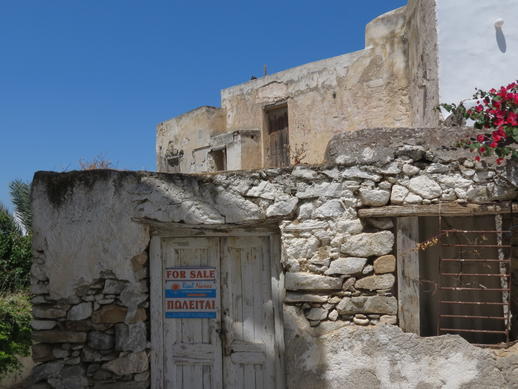
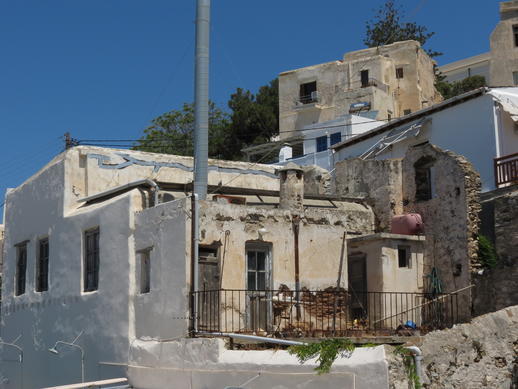
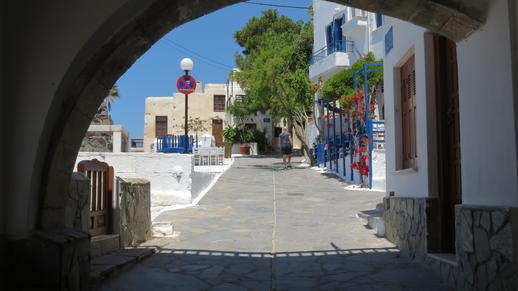
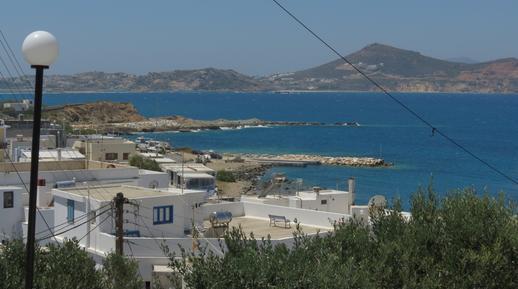
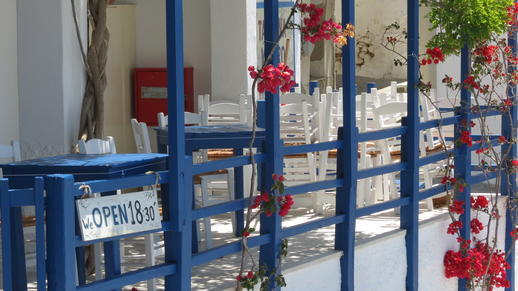
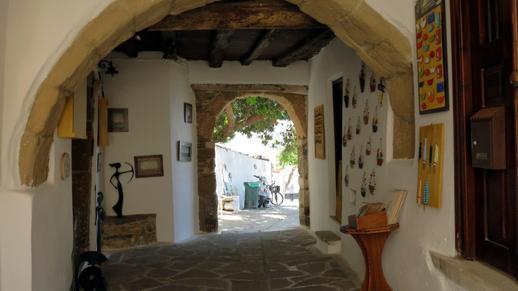
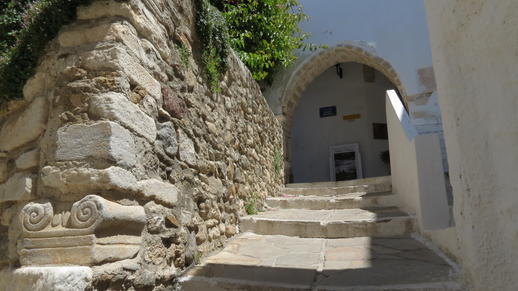
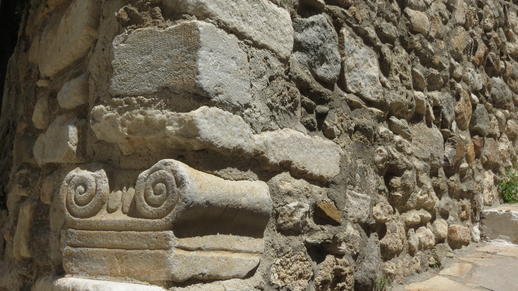
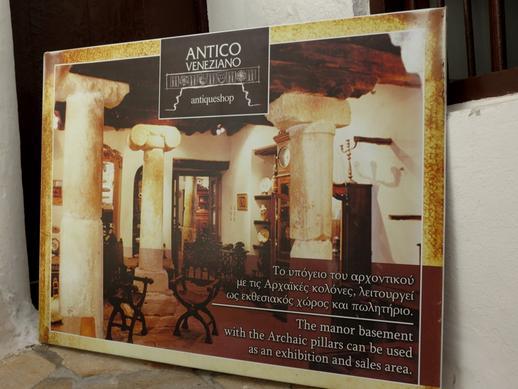
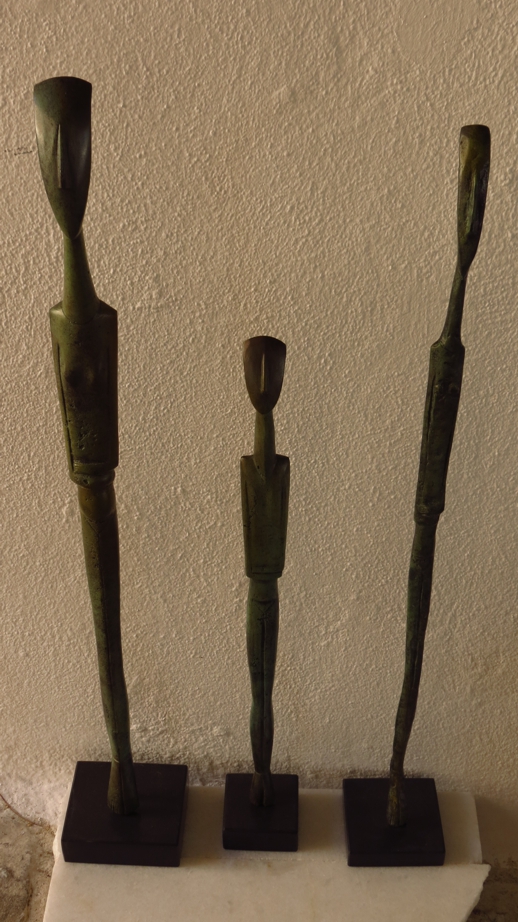
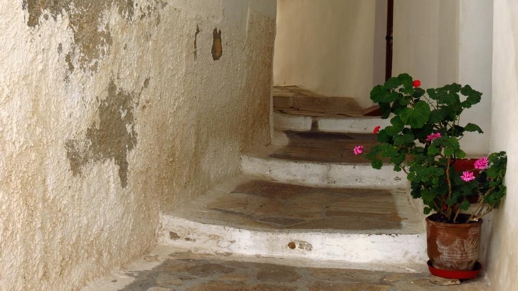

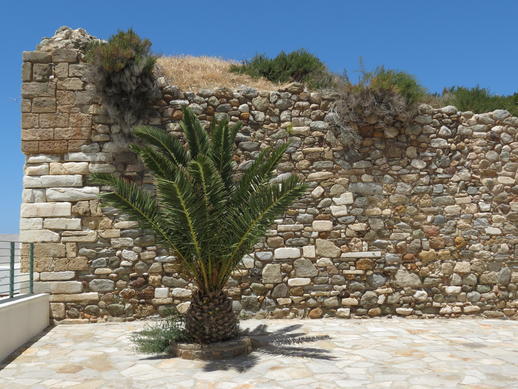
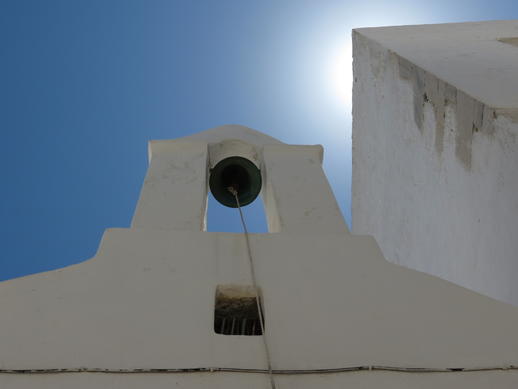
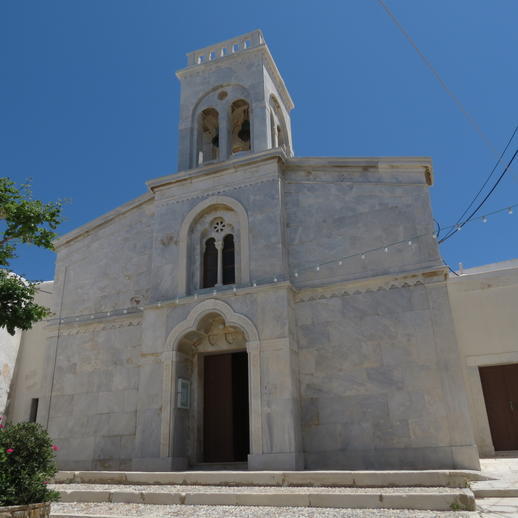
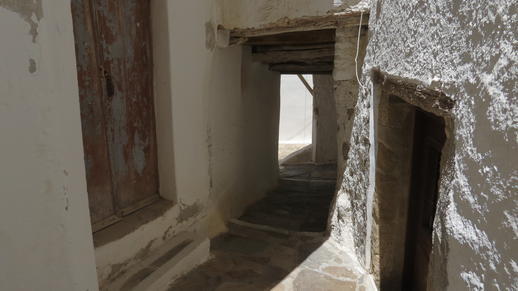
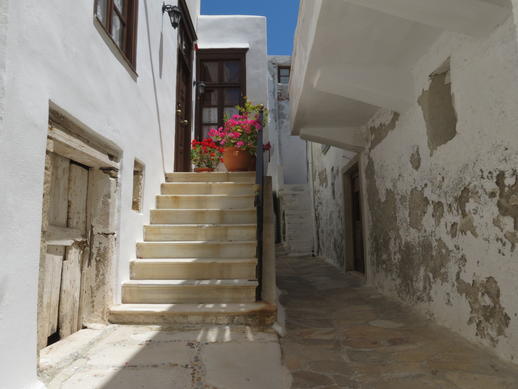
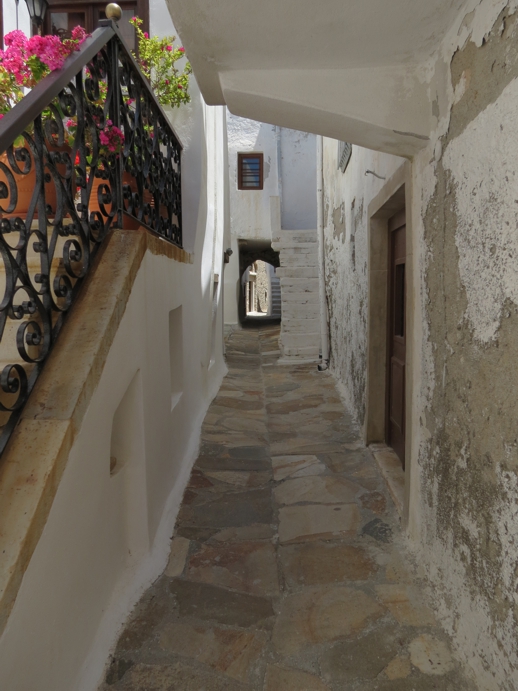
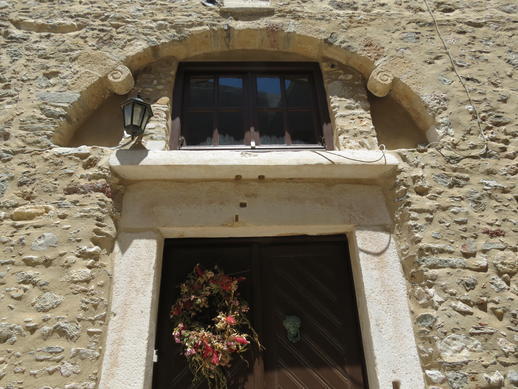
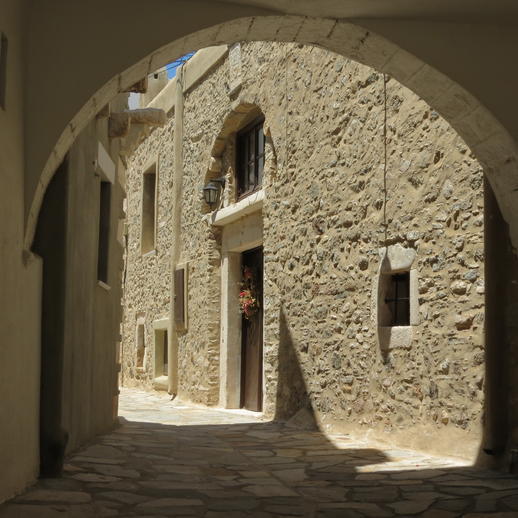

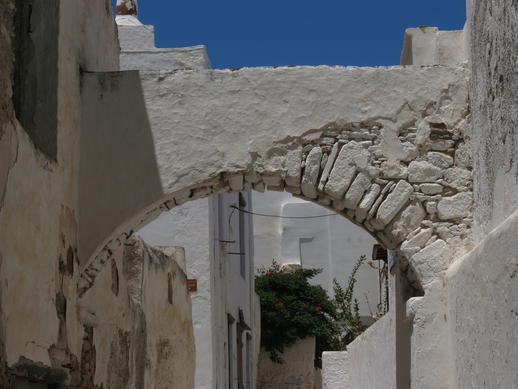
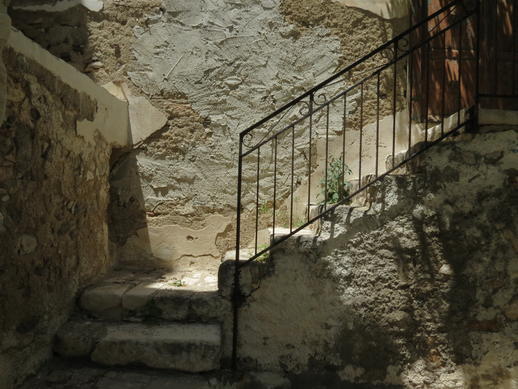
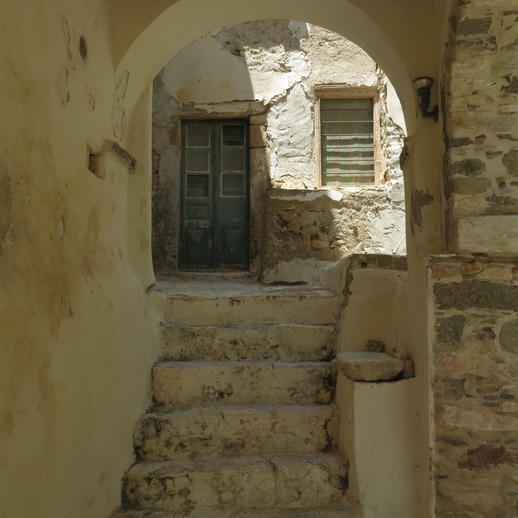
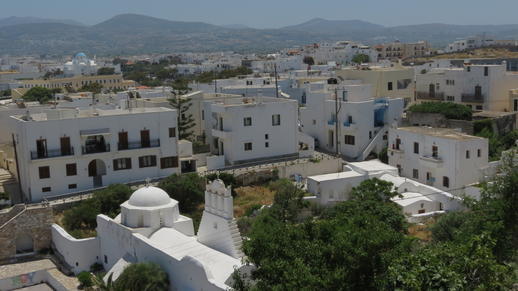
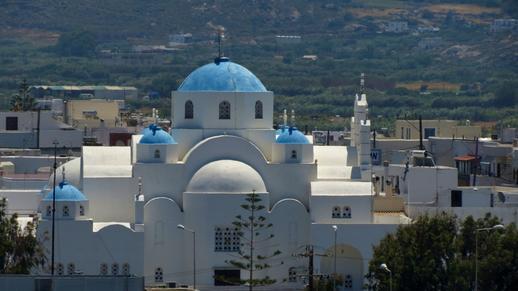
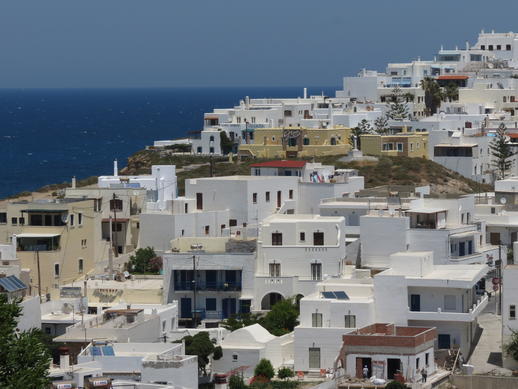
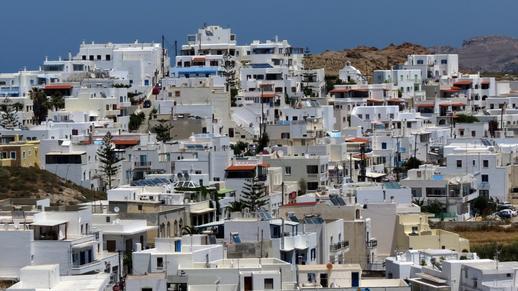
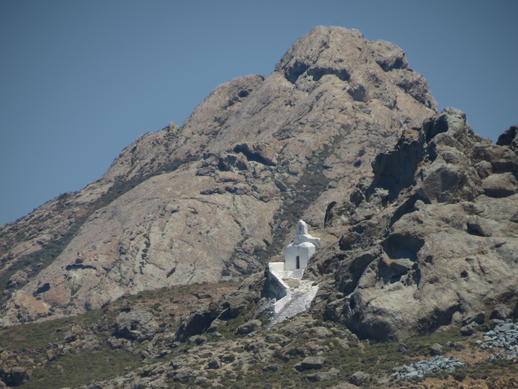
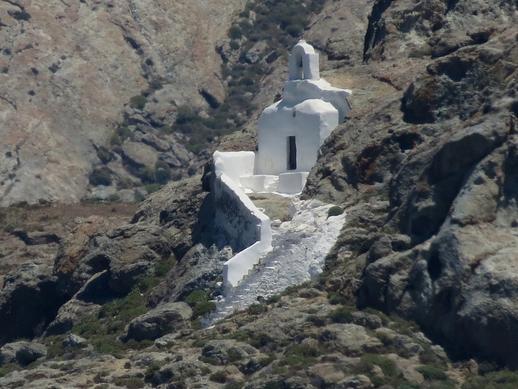
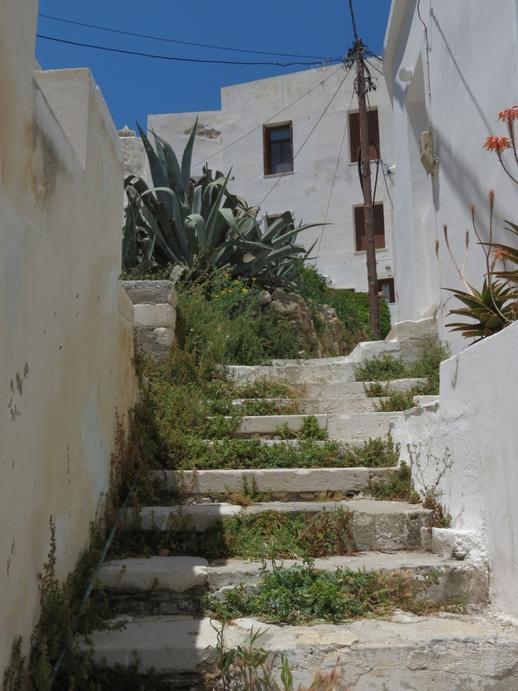
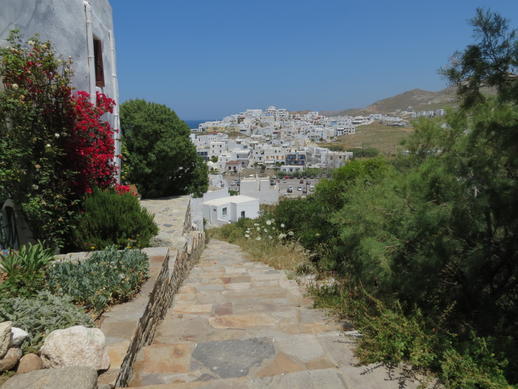

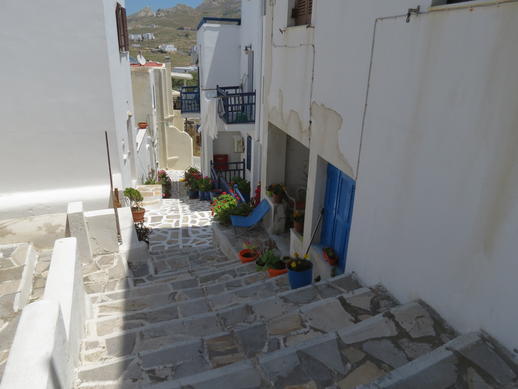
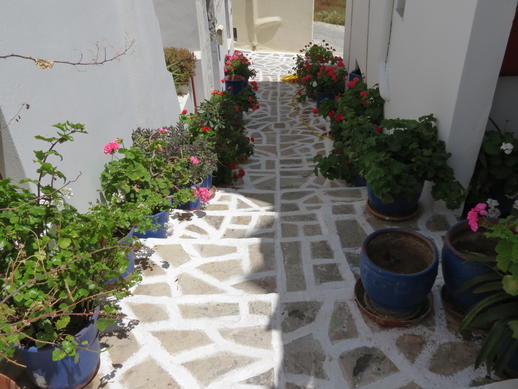
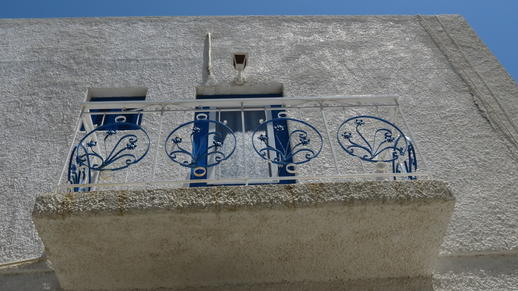


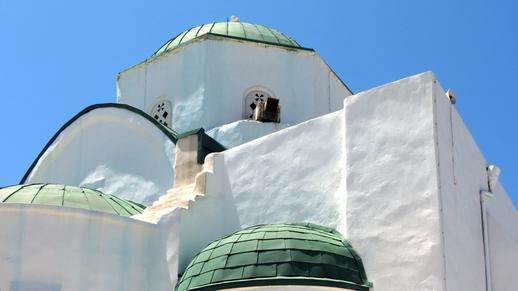
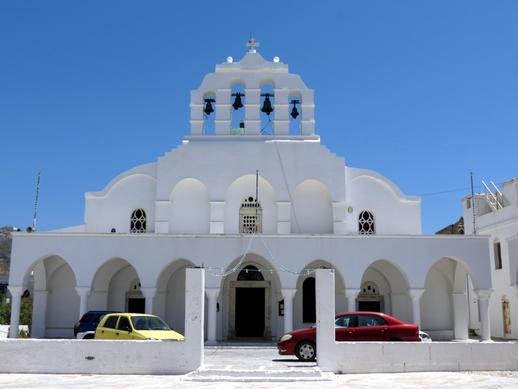
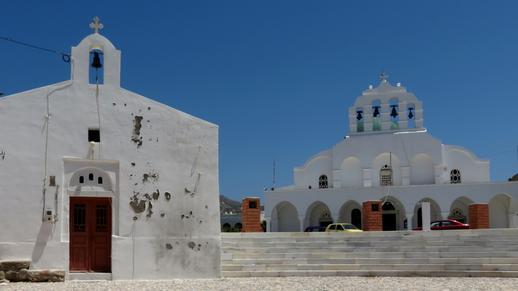


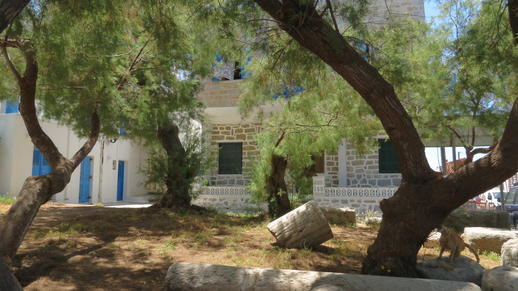
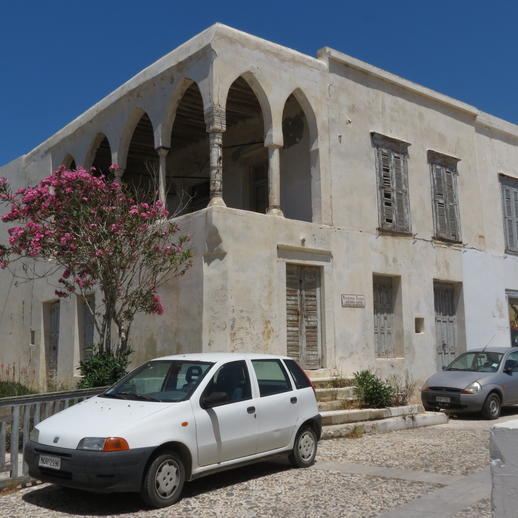
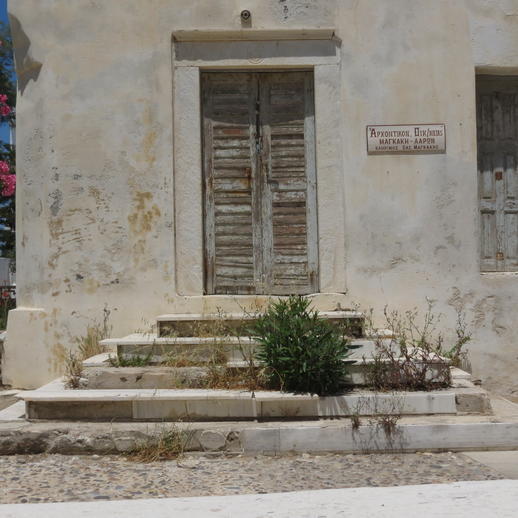
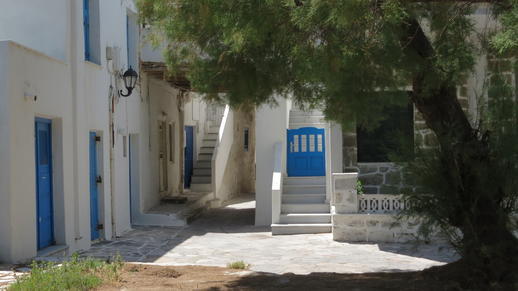
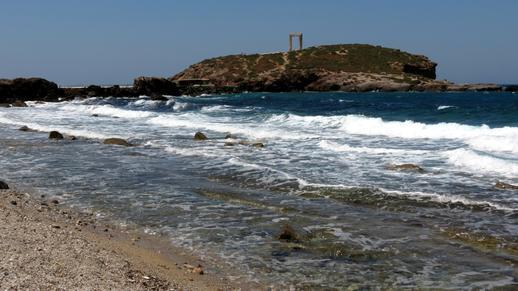
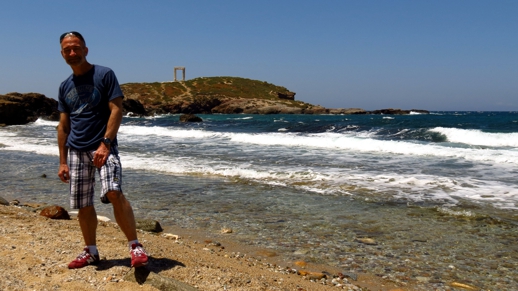
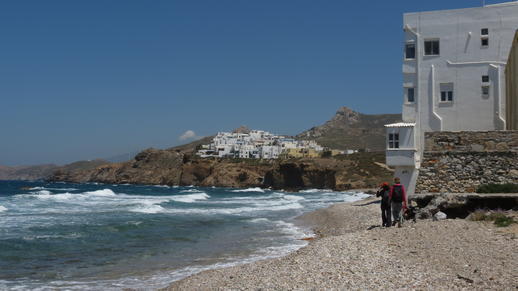


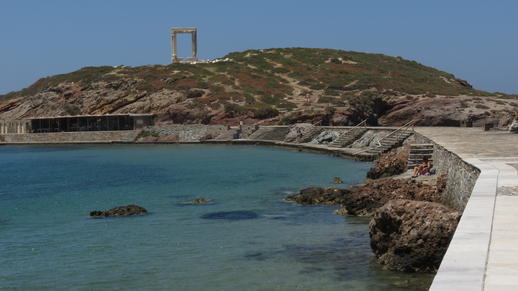
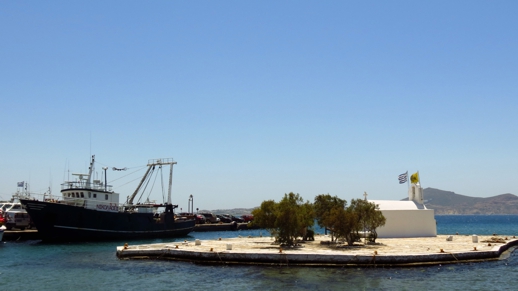
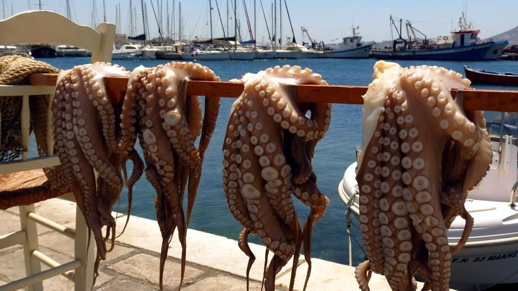
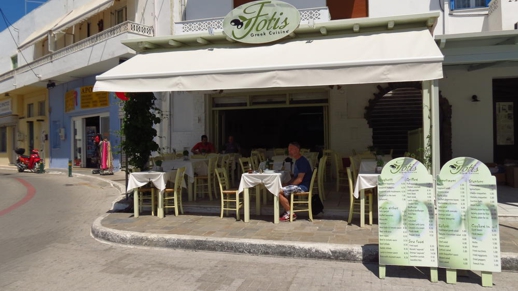
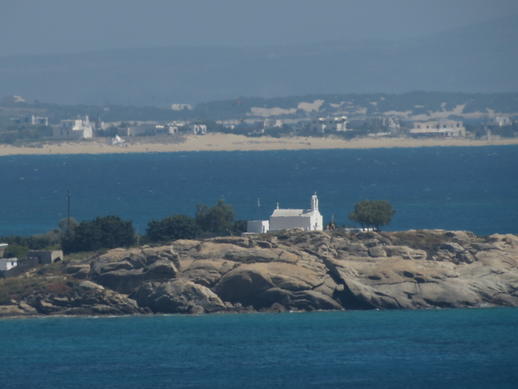
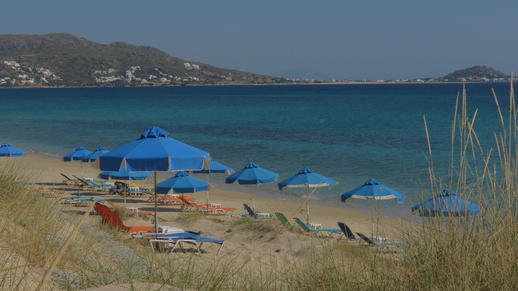

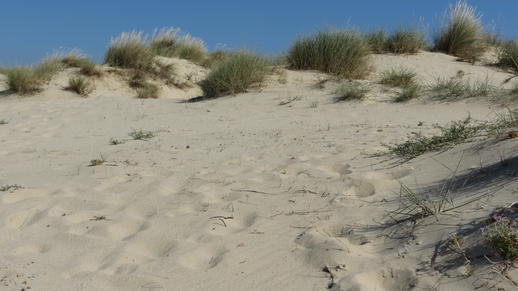
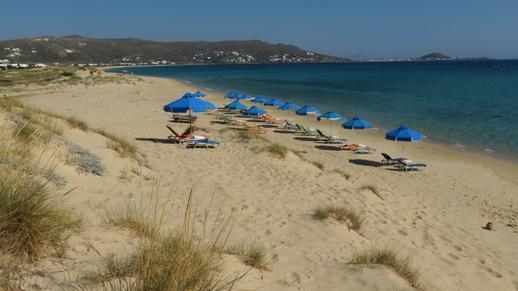
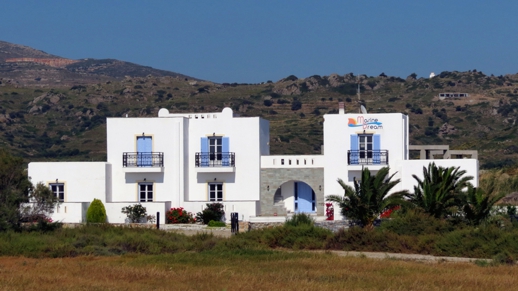
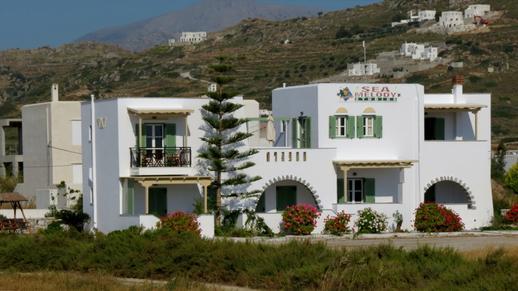
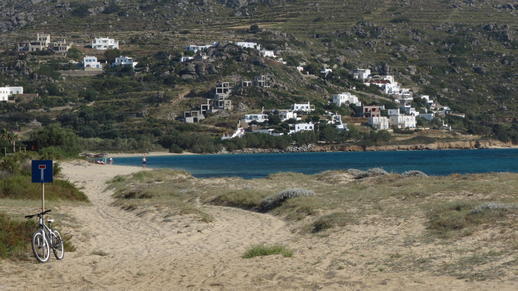
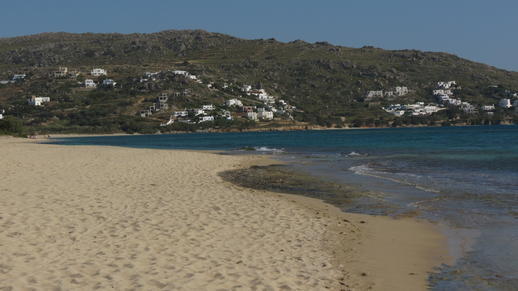

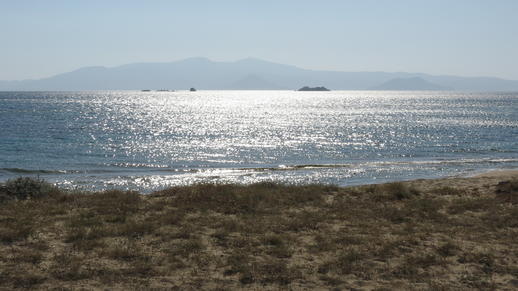
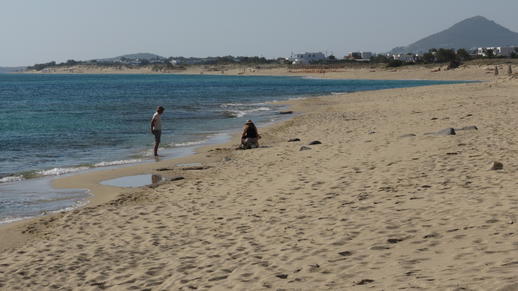
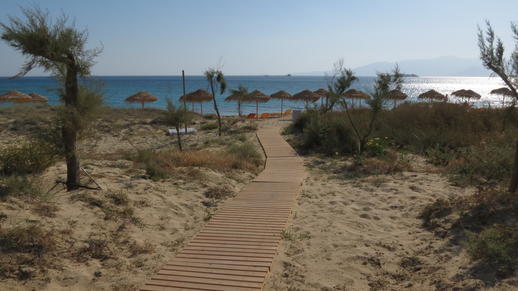
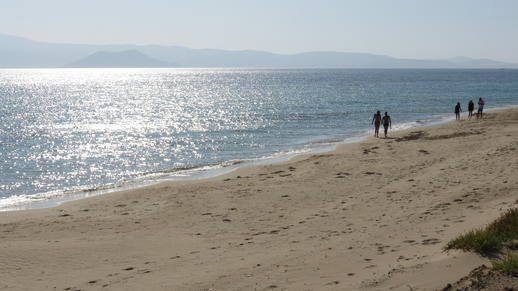
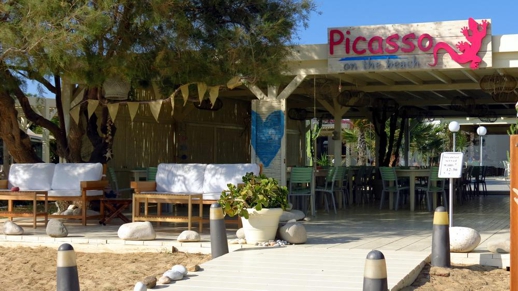
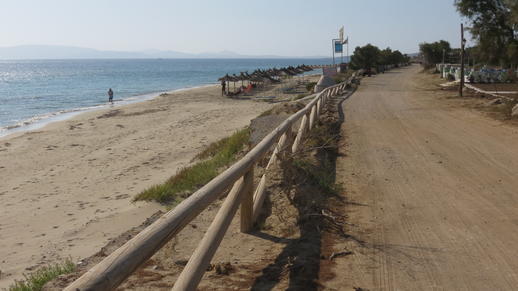
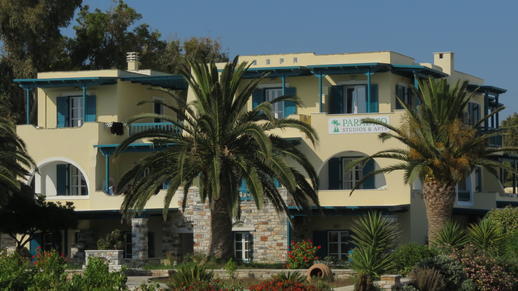
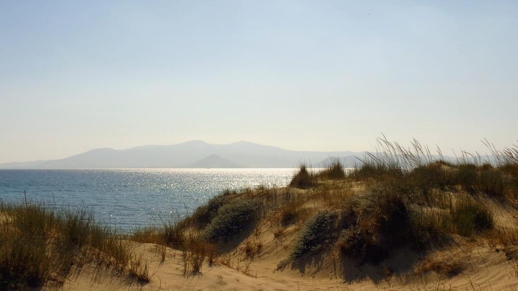
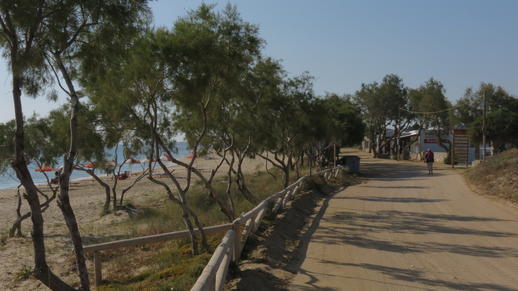
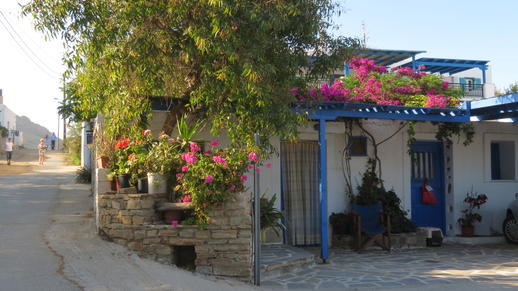
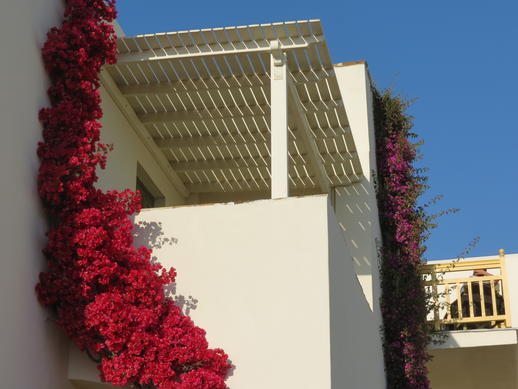
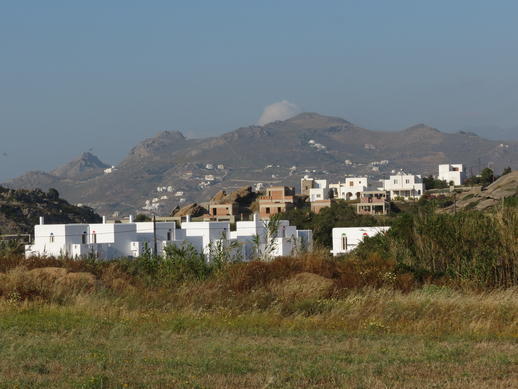
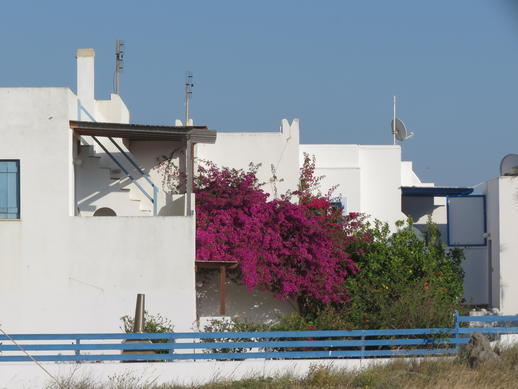
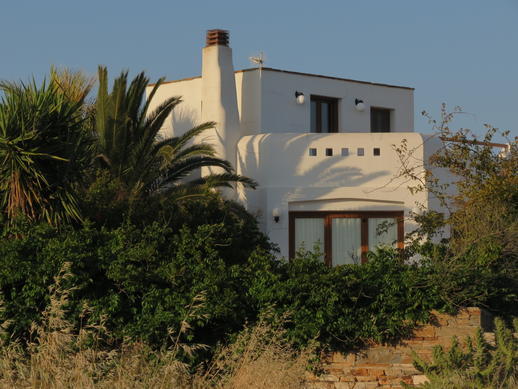
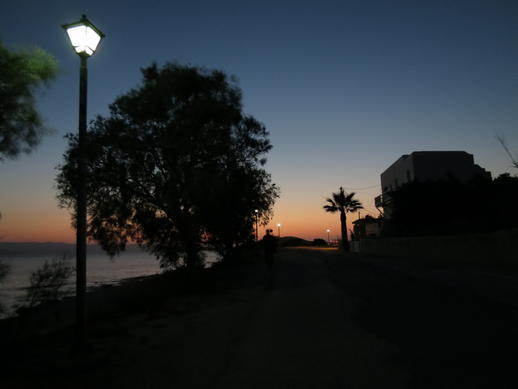
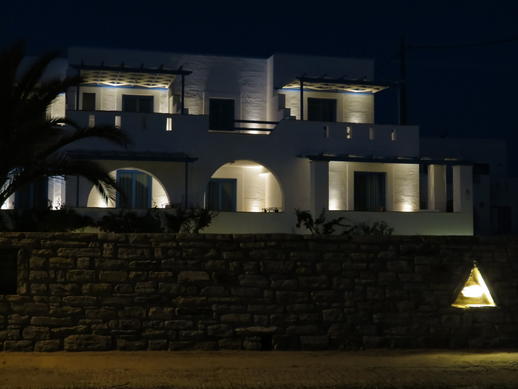
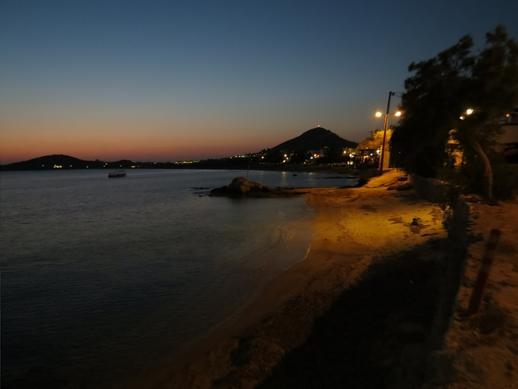
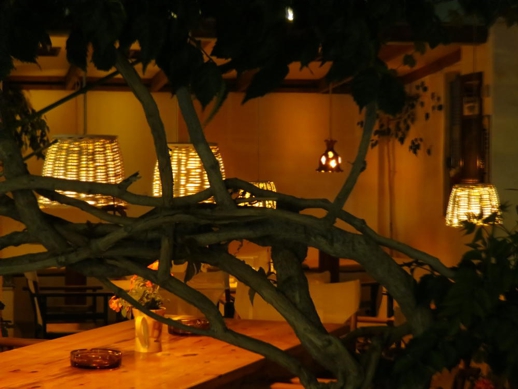
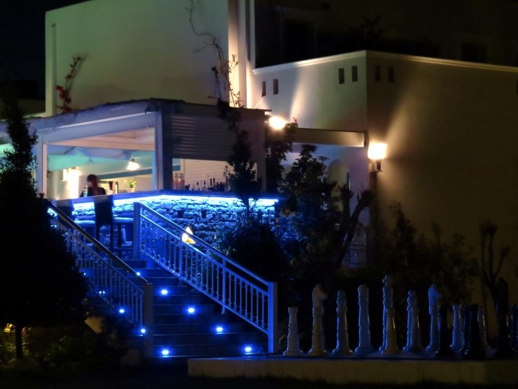
This is perhaps the most complete travel post I’ve ever read, and the Bougainvillea vines are definitely the largest I’ve ever seen. I loved both the post and the contrast between the Bougainvillea and the white/blue Naxos scenery. The Aegean sea has many beautiful islands. Some of the are not so well known, for example Skiathos, Skopelos and Alonissos, especially the latter. They are definitely worth a visit.